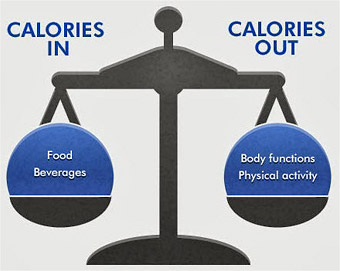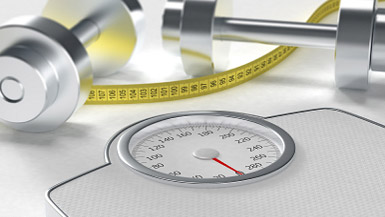“SHOULD I EAT BACK THE CALORIES BURNED FROM EXERCISE?”

“Should I eat back my exercise calories?”
This is a common “beginner question” that I get asked, and it’s actually a bit of a confusing one that ultimately stems from a basic misunderstanding of how the fat burning process works.
For example, someone will tell me that their daily calorie intake for fat loss is 2200, but they also burn an extra 400 calories through exercise. They’ll then go on to ask if they should be eating back those 400 calories that they’ve burned.
If you’ve been asking this question yourself, then the truth is that you’re simply looking at this whole thing from the wrong angle.
When it all comes down to it, losing fat is simply about managing your total net energy balance in the big picture.
In other words, at the end of the day or week when you add up all the calories you’ve burned versus all the calories you’ve consumed, you must be in a situation where calorie expenditure exceeds calorie consumption.
In doing so, you’ll have created what is known as a “calorie deficit”, and your body will be forced to break down its fat stores to obtain a source of energy.
How To Create A Net Calorie Deficit

You can create your calorie deficit in two ways…
1) Eating less food in order to reduce calorie intake.
2) Exercising more in order to increase calorie expenditure.
In almost all cases you’ll be doing some combination of both.
You’ll be tracking your food intake and eating a bit less than you normally do, and you’ll be exercising more by performing weight training and cardio sessions throughout the week.
The combination of those two will create a net calorie deficit for fat loss.
For that reason, the question of “eating back exercise calories burned” really doesn’t make sense, since exercise is one of the very things that helps you create a calorie deficit in the first place.
If performing a particular cardio workout allows you to burn 400 calories, why would you intentionally go and re-consume those same 400 calories when the basic goal itself is to burn more calories than you consume?
Again, this whole question of “eating back calories burned” is really just an issue of viewing fat loss itself from an incorrect perspective.
How Do You Want To Create YOUR Calorie Deficit?

All this really comes down to is a question of how you personally want to create your own calorie deficit.
A combination of reduced calorie intake and increased calorie expenditure is almost always the best approach (rather than just one or the other), but you can “tip the scale” in either direction depending on your personal preference.
In other words…
Would you prefer to only reduce your food intake very slightly but perform a higher amount of exercise?
Or would you prefer to reduce your food intake by a larger amount but perform a smaller amount of exercise as a result?
Since fat loss really just comes down to creating an overall NET calorie deficit in the big picture, either approach is ultimately fine and will create the same bottom line result.
For example…
You could eat 2400 calories per day and burn an average of 400 calories through exercise…
Or you could eat 2300 calories per day and burn an average of 300 calories per day through exercise…
Or you could eat 2200 calories per day and burn an average of 200 calories through exercise…
In the end, the net result is the same.
All you’re really doing here is eating a certain number of calories each day, and then using your exercise plan to burn enough additional calories in order for fat loss to occur.
I’m personally not a big fan of performing cardio on a frequent basis, so I prefer to simply reduce my daily calorie intake by a larger margin and only perform a couple cardio sessions throughout the week.
However, there are others who prefer being able to eat more food throughout the day, and are fine making up for it by burning more calories through exercise.
It’s ultimately just a matter of personal preference and finding out which approach works best for you.
How Large Should Your Calorie Deficit Be?

My advice is to simply find the right balance for yourself between eating fewer calories and performing additional exercise until you’re losing around 1-2 pounds per week on a consistent basis.
Yes, you can create a larger calorie deficit and lose more than this, but for most people it won’t be sustainable over any reasonable length period of time.
1-2 pounds per week is typically the proper range when it comes to maximizing short and long-term adherence to the diet, as well as maintaining training performance, controlling hunger keeping other factors (hunger, energy levels, mood, libido etc.) in check.
If you only have a small amount of fat to lose and simply want to get your diet over with quicker, then yes, it is okay to be a bit more “aggressive” with your deficit if you’d prefer.
However, for the majority of people, 1-2 pounds per week is a good range that will have you losing fat at a decent speed while still feeling physically and mentally fine throughout the process.
It might not sound like a lot, but it adds up very quickly and represents a total loss of anywhere from 12-24 pounds in only a 3 month period.
So, just start off with an estimated daily calorie intake for fat loss (you can check out my previous post outlining my recommended cutting macros to get an estimated starting point), and then lay out your weight training and cardio sessions throughout the week. Anywhere from 3-5 weight training sessions along with 3-4 cardio sessions would be typical.
From there, monitor your changes in body weight and tweak your plan accordingly based on the results.
If you aren’t losing fat in that 1-2 pound per week range, you can either reduce your calorie intake slightly, perform additional cardio, or some combination of both.
If you’re losing more than the 1-2 pound per week range, you can optionally scale back by increasing calorie intake, reducing cardio, or some combination of both.
“What If My Goal Is To Gain Muscle?”

Most people who ask the “should I eat back my exercise calories” question are generally aiming to lose fat, which is why this article addresses the topic from that perspective.
However, if you’re asking this question and your primary goal is to gain muscle, then the exact same logic applies.
The only difference is that you’ll be aiming to create a calorie surplus rather than a deficit. In other words, you need to be consistently consuming more calories than you burn.
Once again, you’ll just want to find the right balance between the increased food intake and your weight training/cardio sessions so that you’re creating a net calorie surplus in the overall picture. The question of “eating back burned calories” doesn’t apply here either.
In addition to that, your total body weight change should be closer to around half a pound gained per week rather than the 1-2 pounds per week fat loss figure I just outlined.
Building muscle is a much slower process than losing fat is, and you need to take a gradual, steady approach with it in order to prevent excessive fat gain.
The Bottom Line
So, should you “eat back calories burned” or not?
The answer is that there is no answer, since it simply doesn’t make sense to view things in this way.
All you’re really doing here is combining your calorie intake with your calorie expenditure in whatever way you prefer in order to create an overall calorie deficit for fat loss or an overall calorie surplus for muscle growth.
That’s all there is to it.
If you found this article helpful, make sure to sign up for your FREE custom fitness plan below...




